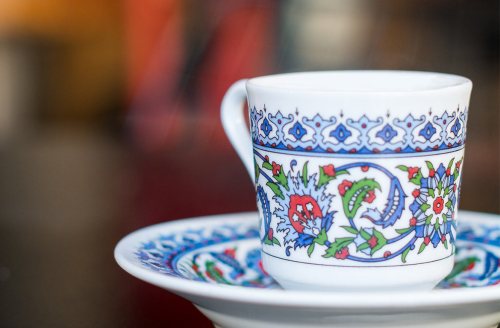Our editors independently select these products. Making a purchase through our links may earn Well+Good a commission
Lebanese White Coffee Is the Go-To After-Dinner Drink for Better Digestion
The star ingredient in Lebanese white coffee, orange blossom water, is touted as having a soothing effect on the digestive system.

Philippe Massoud grew up on Lebanese white coffee. As a child in Beirut, Massoud was accustomed to sipping the drink after enjoying a big dinner, playing in the sun for too long, or getting a tummy ache. The star ingredient, orange blossom water, is touted throughout Levantine cultures as having a soothing effect on the digestive system.
Experts in This Article
Philippe Massoud is the executive chef and owner of Ilili, a Lebanese-Mediterranean restaurant in New York City’s Flatiron District.
“From a cultural point of view, it’s something that we finished the meal with usually after you’ve eaten a big meal. And we normally spend two, three, four hours at the table eating, so it’s Thanksgiving every day,” says Massoud, who is the executive chef and owner of ilili, a Lebanese-Mediterranean restaurant in New York City’s Flatiron District. “The Levantine diet, [with] the mezzos and everything else, you finish the meal with either an orange blossom tea or a fresh mint tea or a Turkish coffee with the caffeine. Most people usually will opt for the orange blossom tea because it helps with the digestion and it’s a good way to finish off the entire meal.”
Orange blossom water is distilled from the bitter orange tree, which is used for its antioxidant, calming, and digestive stimulant properties, among others. And don’t let the name fool you, Lebanese white coffee is caffeine-free and only referred to as white coffee because it’s clear and traditionally served in of the same cups used for Turkish coffee. It’s made by simply mixing orange blossom water with warm water. Unlike orange tea, it doesn’t have tannins and it’s very light in terms of flavor. Still, Massoud says the taste can be a bit overwhelming to newcomers.
“They’re caught off guard because it has that perfumy, flowery taste to it,” says Massoud. “And they’re like, ‘Oh, well this tastes like soap or it tastes like perfume.’ And many American guests that I’ve had, at first they’re like, ‘Woah, this is too much.’ But then after the third or fourth sip, they go, “Wow, I really get this. I’m really enjoying it.'”
Massoud says the best place to get orange blossom water is from his cousin’s farm in Lebanon. But when he’s stateside, he like the brand Cortas ($12), which you can get online. Massoud also recommends the brands Al Wadi ($16) and Mymouné ($16).
Shop now:Cortas, $12
To make Lebanese white coffee, add 1 to 2 tsp of orange blossom water into 1 teacup of hot water. You can sweeten with sugar, honey, or another sweetener of your choice, but the less sweetener you add the better, says Massoud. You can also take it to the next level by adding flavors like chamomile or mint. “Just sip gently and don’t be shy in having a second one—you’re not obligated to stick to one,” he says.
Orange blossom water can also be added to savory sauces, dressings, simple syrups, pomegranates, berries, juices, cold water, and lemonade. “Oh my God, it is heavenly in lemonades,” says Massoud. “It will take your lemonade to a whole new dimension with some fresh mint. Unbelievable! Like divine! Really divine!”
However you decide to use orange blossom water, Massoud says to have fun. “The ingredient itself is extremely healthy and has a lot of benefits,” says Massoud. “Get acquainted with it. And then let your inner chef allow you to experiment.”
Sign Up for Our Daily Newsletter
Get all the latest in wellness, trends, food, fitness, beauty, and more delivered right to your inbox.
Got it, you've been added to our email list.









